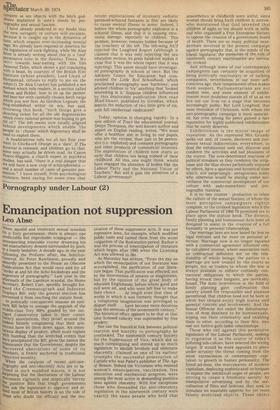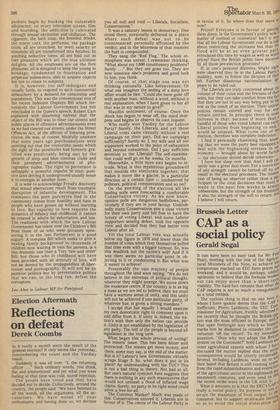Pornography under Labour (2)
Emancipation not suppression
Leo Abse
\Yhen squalid and irrelevant sexual scandals hit a Tory government, there is always one Predictable but improbable scapegoat — the Unsuspecting miserable voyeur dreaming his s,ad masturbatory dreams surrounded by porn, in a lonely bedsitter. A decade ago, in the year following the Profumo affair, the SolicitorGeneral, Sir Peter Rawlinson, proudly and absurdly presented to the House an Obscene 1ublications Act that would once and for all .strike at and hit the Soho bookshops and the ImPorters of pornography." Last year in the aftermath of the Lambton scandal, the Home Secretary, Robert Carr, speedily brought forWard the Cinematograph and Indecent °Isplays Bill: only the general election has Prevented it from reaching the statute book. In politically concupiscent seasons an antit'orn Bill helps to assuage the anguish of the thiddle-class Tory MPs: goaded by the out',aged Conservative ladies in their consti;oency associations, they prowl around the tobbies bitterly complaining that their aristocrats have let them down again. An ostentatious display of prudery, albeit more replete wk Ith humbug than the wretched events that "ave precipitated the Bill, gives the nation the reassurance that the Government, despite the „.(1'scovered aberrations of some of its '"
„embers, is firmly anchored in traditional 'estrictive morality.
When the catalysts of recent anti-porIlography and anti-obscenity Acts are to be 'ound in such muddied waters, it is not Surprising that the libertarians of the Labour ,!ovement vigilantly and sceptically survey ,`"e punitive Bills that tough governments ,;"en ask the legislature to approve: and in`4eed most of British history is on the side of those who doubt the efficacy and the mo
tivation of these suppressive Acts. It was not repressive laws, for example, which modified public taste and turned them from the worst vulgarities of the Restoration period. Rather it was the process of emancipation of literature which began after 1695 when the Licensing Act was allowed to die.
As Macaulay has written, "From the day on which the emancipation of our literature was accomplished, the purification of our literature began. That purification was effected, not by the intervention of senates or magistrates, but by the opinion of the great body of educated Englishmen, before whom good and evil were set, and who were left free to make their choice . . . At length even that class of works in which it was formerly thought that a voluptuous imagination was privileged to disport itself .. . have become more decorous than the sermons of the seventeenth century." The historical effect appears to be that at that time licensed salacity was superseded by free prudery.
Nor can the historical link between political reaction and hostility to pornography be overlooked. The nineteenth century Society for the Suppression of Vice, which did so much campaigning and stirred up so much legislation to abolish brothels and eliminate obscenity, claimed as one of its earliest triumphs the successful prosecution of Carlisle who was Paine's publisher of The Age of Reason. Indeed the Victorians who resisted women's emancipation, vaccination, free education and mechanical progress, were among the most active in demanding punitive laws against obscenity. With few exceptions those who demanded the anti-obscenity legislation in the nineteenth century were exactly the same people who held that anaesthetics in childbirth were sinful, since women should bring forth children in sorrow, who maintained that God intended that children of eight or ten should work in mills, and who organised a Free Enterprise Society to oppose the creation of a government board of health. There are so many political neanderthals involved in the present campaign against pornography that, in the minds of the liberal legislator, the memories of the role of nineteenth century reactionaries are inevitably evoked.
And although some of our contemporary campaigners can certainly be acquitted of being politically reactionary or of lacking compassion, nevertheless, in our more selfconscious age, their temperament often makes them suspect. Parliamentarians are not modest men, and some element of exhibitionism must doubtless sustain all of us as we live out our lives on a stage that becomes increasingly public. But Lord Longford, that most immodest of Christians, with whom the anti-pornography campaign is most associated, has even among his peers gained a rare reputation for highly-publicised exhibitionism that he surely deserves.
Exhibitionism is the mirror image of voyeurism. As the repressed Mrs Grundy seeks out and, of course, discovers and con demns sexual indiscretions, everywhere, so does the exhibitionist seek out, discover and condemn the activities and sad pleasures of the voyeur. The over-determined reactions of political streakers as they condemn the strip tease and the blue shows pathetically enjoyed by others, have a spurious and hysterical tone which, not surprisingly, antagonises many who otherwise would be placing under surveillance the commercial envelopment of our culture with sado-masochistic and pornographic material.
It is no less counter productive to relate the culture of the sexual fascists, of whom the more perceptive campaigners rightly complain, to the civilised legislation which the Labour Parliament of 1966-70 permitted me to place upon the statute book. The divorce, family planning and homosexual Acts were all designed to assist in the creation of a full humanity in personal relationships.
Our marriage laws are now based far less on legal restraint and far more on personal af fection. Marriage now is no longer equated with a commercial agreement informed only by calculated interest, where association rests on contractual definition not on the rela tionship of whole beings; the parties to a marriage are now treated by the courts as people, not as traders to whom the law is always available to enforce ruthlessly contractural obligations to which the parties, having struck their bargains, are inevitably bound. The state intervention in the field of family planning gave confirmation that society aimed for responsible and planned parenthood, that children need not be born at whim but should enjoy high status and parental concern and involvement. And the Sexual Offences Act ended the dehumanisation of men destined to be homosexuals, wiping out their criminality and enabling them to enter, according to their fate, into real not furtive guilt-laden relationships.
Those who rail against this permissive legislation of the Labour Parliament, seeking to stigmatise it as the source of today's polluting sub-culture, have selected the wrong target. It would be more apposite to place under scrutiny the threat coming from the latest excrescences of contemporary capitalism to growth in human personality. The hired ad-men, the mercenaries of modern capitalism, deploying sophisticated techniques to exploit the instinctual urges of people, are striving to create a fetishistic society: by manipulative advertising and by the sexualisation of films and fashions, they seek to stimulate an insatiable appetite for yet more falsely eroticised objects. These object pushers begin by hooking the vulnerable adolescent: on every television screen, film and hoarding, the addiction is cultivated through sexual excitation and titillation. The cigarette, the bath soap, the branded drinks, the motor cars, the perfumes, the package tours, all are eroticised, by overt salacity or innuendo all are transformed into fetishes. In soothing seductive tones, all are held out as fore pleasures which are the true ultimate delights. All the emphases are on the fore pleasures: all is designed to keep the young in bondage, condemned to frustration and perpetual pubescence, able to acquire objects but not to relate to subjects.
It is, however, too self-indulgent and usually futile, to respond to such commercial debauchery by a demand for censorship and punishment. This was the conventional mix of the recent Indecent Displays Bill which fortunately the Labour Government has not reincluded in the Queen's speech. Robert Carr explained with disarming naivete that the object of the Bill was to clear our streets and public places of offensive advertisements even as we had cleared our streets, under the Street Offences Act, of the affront of loitering prostitutes. He was, of course, blissfully unaware that some years ago psychoanalysts were pointing out that the voyeuristic needs which the sight of the prostitutes had formerly gratified was predictably being met by the growth of strip and blue cinemas clubs and their pavement advertisements of photographic nudes. The right to perversion is unhappily a powerful impulse in man: punitive laws driving it underground usually mean it re-emerges in another form.
It is wise to acknowledge Freud's discovery that sexual aberrations result from traumatic disruption of infantile development. The resonance the porn purveyors find in the community comes from hostility and hate in people who have grown up without learning to love. But capacity to love requires the dynamics of infancy and childhood: it cannot be created in adults by exhortation and law. The readiness with which the new Labour Government has taken over the Children's Bill from those of us who were privately sponsoring it in the last Parliament is a good augury. A complex Bill which seeks to give a healing family background to thousands of children now waiting in vain for parents, is a less dramatic one than a Tory 'law and order' Bill: but those who in childhood will have been provided with an armoury of love, will not be dented by the propagandists of libertinism and pornography. It will not be by punitive politics but by preventative politics that we can, in the long run, defeat the corruptors.
Leo Abse is Labour MP for Pontypool.



































 Previous page
Previous page